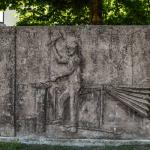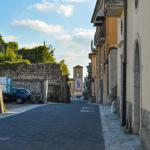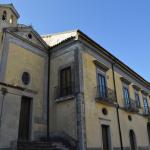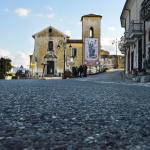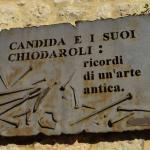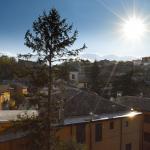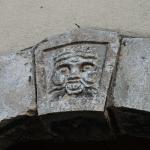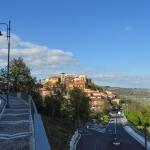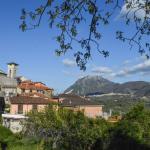The Municipality of Candida rises on the eastern slopes of the hill called Toppa Sant'Andrea. It's a town with 1,121 inhabitants, located 579 metres above sea level, at 14 km from Avellino. The territory extends for 5.35 sq km and the adjoining municipalities are: Lapio, Manocalzati, Montefalcione, Parolise, Pratola Serra and San Potito Ultra.
The etymology of the name has a classical origin, indicating the white rocks on which the oldest part of the town is located. The inhabitants are called Candidesi and their patron saint is Saint Philip Neri.
PLACES OF INTEREST
- Church of Santa Maria Assunta in Cielo (Saint Mary of the Assumption into Heaven) - Fascinating religious building located in the square, with a sumptuous stone portal and Baroque decorations, built at the behest of Maria De Cardona and opened for worship in 1540
- Church of Concezione di Maria (Our Lady of Conception) - Inserted in the monastery founded by the Benedictine fathers in the 15th century, it is known with the name of "Montevergine Monastery"
- Ruins of the Filangieri Castle - Built in the Lombard period on a rocky spur, at the highest point of the ancient centre, parts of the ancient walls are still visible in the current building
- Church of Madonna del Carmine (Our Lady of Mount Carmel) - Small church built in 1673, it's the seat of the Confraternity of Our Lady of Mount Carmel
- Chapel of Madonna della Speranza (Our Lady of Hope) - It was the family chapel of the Del Giudice family, dedicated to Our Lady of Hope, to which the square in front of Del Giudice Palace is also dedicated
- Filangeri Palace - Built by Caterina Filangieri, in the first half of the 15th century, today only the historical ruins remain, which can be visited from the outside
- Del Giudice Palace - Located at the entrance to the town, it's one of the most interesting buildings in the town, built in the early 19th century, with a very simple architectural composition
- Iorio Palace - Elegant 18th century mansion that today houses the Tenute Casoli winery
- Other churches - Church of SS. Trinità or Sant’Agostino (Holy Trinity or Saint Augustine) and Church of Madonna Addolorata o dei Sette dolori (Our Lady of Sorrows or of the Seven Sorrows)
- Fountain - Defined " Abbascio alla fontana " (i.e. down through the fountain) it has historically been the most important in the town, both for water supply and for washing dirty clothes
- Other fountains - Nova Fountain, Selvecorte Fountain, Acqua Radici Fountain, Fountain of the Starze, Fountain of the Pascucci, ancient well built behind the Church of the Concezione di Maria
- Historic Centre - Heart of the town, where the oldest part of Candida is kept, enhanced to the fullest through a splendid architectural regeneration
- Wineries - Tenute Casoli and Cantina Contrada
- Municipal Sports Center - Accommodation and tourist-sports facility with footbal and five-a-side football fields, tennis court, swimming pool, bar and restaurant, in a 45,000 m2 green area
EVENTS
- Candida: History, Places, Flavours and ancient arts - Village fair held in August that includes antique markets, tastings of typical dishes of the peasant tradition, excellent local wines, folk-ethnic music and street artists
- Grape Harvest Festival - It takes place in September and includes the re-enactment of the ancient art of grape harvest and pressing, all enlivened by typical products, local wines and music
- Jazz under the stars - Village fair much awaited for music and food and wine, it takes place inside the splendid Di Iorio Palace
- Christmas concert - Concert held a few days after Christmas, at the Church of Maria SS. Assunta in Cielo (Holy Mary of the Assumption into Heaven) in Piazza dei Martiri, and which also gives way to the opening of the Christmas markets and stands where you can taste typical local products
TYPICAL FOOD AND PRODUCTS
- Fiano di Avellino DOCG - One of the finest white wines in Italy and on the international market
- Fusilli with pork rinds - Traditional Irpinia first course, consisting of fresh handmade pasta with sauce and rind
- Cotechino - Typical Irpinian product, it has different uses and can be prepared with sauce, as a dressing for pasta, or together with beans, "fasuli and cotechino", to be enjoyed together with homemade bread
- Pertecaregna style salted codfish - Typical Irpinian dish, simple and tasty, which is part of our gastronomic tradition and masterfully combines salted codfish with crusco pepper
- ‘Mmaretata soup - Typical winter dish based on meat and vegetables that "marry" each other (from which " mmaretata) generating a tasty combination
- Pork and Pepaini - Typical dish of the traditional cuisine of Irpinia, made with pork and peppers
- Turnips and Potatoes - Among the poor dishes for its simplicity, it's a typical recipe of the Irpinian tradition
FUN FACTS
The inhabitants of Candida are called Chiodaroli because, in the history and economy of the village, a fundamental role was played by the producers of nails at an artisanal level, until the mid-20th century.
HISTORICAL NOTES
The origin of Candida seems to be very ancient, as evidenced by the findings of an excavation in Cesine, in particular of a patera, a tool typically used in sacrifices by the ancient Romans, symbol of a pre-Roman settlement. Overall, the town dates back to more medieval times and, in fact, the first documented historical record of Candida dates back to 1045, in the Lombard period, when it returned to the County of Avellino, as a hamlet under the dominion of the counts Adelferio and Giovanni.
The first documented news of the Castle of Candida and its lord also date back to more or less the same period, more precisely in the middle of 1110. Also the Norman belonging to the Catalogus Baronum is documented, compiled between 1150 and 1168 following the census ordered by Roger II of Sicily. Moreover, in the mid-12th century, the town of Candida was considerably enlarged, gathering above all around the Castle, a strategic control point for travelling downstream.
Among the various families who have owned the fief over the centuries, the Filangieri, the Cardone and the Caracciolo of Avellino are worthy of mention.
No longer just places to see, but above all experiences to live: Candida and its community are ready to welcome you
Candida
Via Fontanelle, 7, 83040, Candida AV, Italia
Did you like it? Leave a review
Your opinion is important! It will be visible after approval by the editorial staff.
To post a comment you must be an authenticated user. Log in with Social Login
